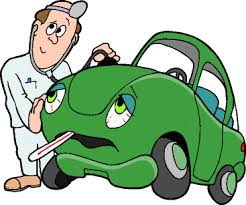When Car need tune up
When are that might make you think you need a tune-up?

* A dirty or clogged engine air filter is more likely to reduce acceleration than fuel economy, according to tests conducted by the EPA. Because filters get dirty gradually over time, you might not notice a small but steady loss of performance until your car is accelerating like a turtle. But if you haven’t changed the filter in a couple of years (or sooner in areas that have a lot of soot in the air), that could be part of the problem.
* A misfiring engine (when spark plugs ignite at the wrong time) could be caused by worn or fouled spark plugs. Bad spark plugs can also cause low fuel economy, hard starting and sluggish acceleration. Most plugs, though, should last 100,000 miles or more, and engine computers do a remarkable job of compensating for worn plugs, so that might not be the main or only culprit.
* Engine deposits caused by low-quality or contaminated gasoline create drivability problems, and the cure for that might be a fuel system cleaning, either by a repair shop or with a gas-tank additive.
* An old oxygen sensor (say, 90,000 miles or more) may still work well enough that it doesn’t trigger the check engine light but could still hurt fuel economy. Engine performance can also be reduced by more serious internal problems, such as valves that don’t seat properly or worn piston rings, or by restrictions in the exhaust system
* An illuminated check engine light signals when something is amiss in the emissions control system, but depending on what the issue is it could also affect fuel economy or engine performance, so don’t ignore it. A faulty oxygen sensor, for example, leaves the engine computer in the dark about how to set the air-fuel mixture, and that can result in poor fuel economy.
When are that might make you think you need a tune-up?
* A dirty or clogged engine air filter is more likely to reduce acceleration than fuel economy, according to tests conducted by the EPA. Because filters get dirty gradually over time, you might not notice a small but steady loss of performance until your car is accelerating like a turtle. But if you haven’t changed the filter in a couple of years (or sooner in areas that have a lot of soot in the air), that could be part of the problem.
* A misfiring engine (when spark plugs ignite at the wrong time) could be caused by worn or fouled spark plugs. Bad spark plugs can also cause low fuel economy, hard starting and sluggish acceleration. Most plugs, though, should last 100,000 miles or more, and engine computers do a remarkable job of compensating for worn plugs, so that might not be the main or only culprit.
* Engine deposits caused by low-quality or contaminated gasoline create drivability problems, and the cure for that might be a fuel system cleaning, either by a repair shop or with a gas-tank additive.
* An old oxygen sensor (say, 90,000 miles or more) may still work well enough that it doesn’t trigger the check engine light but could still hurt fuel economy. Engine performance can also be reduced by more serious internal problems, such as valves that don’t seat properly or worn piston rings, or by restrictions in the exhaust system
* An illuminated check engine light signals when something is amiss in the emissions control system, but depending on what the issue is it could also affect fuel economy or engine performance, so don’t ignore it. A faulty oxygen sensor, for example, leaves the engine computer in the dark about how to set the air-fuel mixture, and that can result in poor fuel economy.
No comments:
Post a Comment